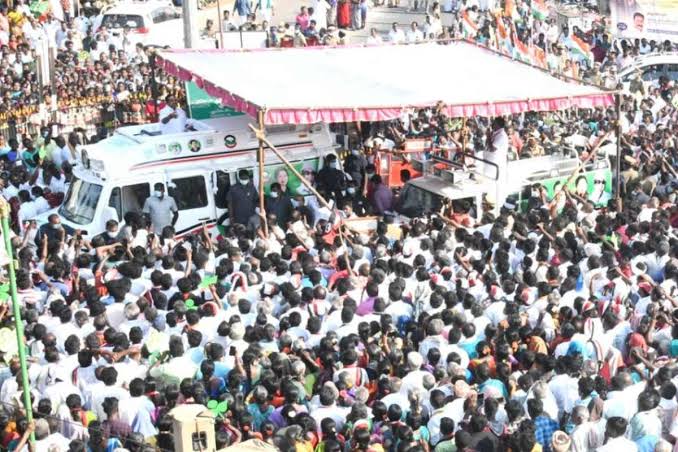
Are elections really free and fair, as the Constitution of India envisages? As Tamil Nadu gears up to face the Assembly elections on April 6, the question about a level playing field among candidates remains largely unanswered. The smaller parties and Independent contestants hardly get any media attention; they cannot compete with the big parties who spend huge money on election campaigns and rallies; and they are at the receiving end of the Election Commission rules too.
In any election, the media focus is largely on the ruling and the main opposition parties. The coverage may include parties which have the ability to spend or have celebrity contestants. In the 2021 Tamil Nadu elections, for instance, the media and analysts follow the ruling All India Anna Dravida Munnetra Kazhagam (AIADMK), the main Opposition Dravida Munnetra Kazhagam (DMK) and three more parties and their alliances – the Naam Thamizhar Katchi (NTK) of Tamil actor-director Seeman; the Amma Makkal Munnetra Kazhagam (AMMK) of T.T.V. Dinakaran, nephew of V.K. Sasikala, ousted AIADMK leader and confidante of former Chief Minister J. Jayalalithaa; and the Makkal Needhi Maiyam (MNM) of actor Kamal Haasan. But does this cover the entire political picture in the State? Is it right to assume that these parties represent the politics of Tamil Nadu?
Two Dalit parties representing significant Dalit and oppressed factions, Bahujan Samaj Party, headed by Mayawati, and Puthiya Thamizhagam party by Dr Krishnasamy are contesting in 50 and 60 seats separately. The Communist Party of India (Marxist-Leninist) – CPI (ML), contesting in 12 seats and The Socialist Unity Centre of India -SUCI (C) from five seats, respectively. It can be understood without saying that they get little attention in the mainstream.
In the coming elections, 4,100 candidates are in the fray – with the highest number of Independent candidates and smaller parties. The candidates from the said major parties account for 1,215, which means 2,885 candidates don’t belong to the mainstream. The significance can be better understood by going through the previous Assembly election figures in the State. In 2016, the number of Independents and candidates of smaller parties was 3,728; in 2011 it was 2,748, and, in 2006, it was 2,586. This is not just an increase in numbers. It is also about the increase in the number of people who believe in the democratic process, irrespective of the electoral algorithm, money and muscle power. They are the torchbearers of a democracy. But are they in a fair competition?
An unfair game
All Indian citizens who turn 25 can contest and win elections in India. But how feasible is this in practice? Everyone knows that it takes money to contest an election. We are not talking about bribing the voters here. The Election Commission has changed the rules of the game whereby only the wealthy can enter the electoral fray. According to a recent amendment to the Conduct of Election Rules Act, the upper limit for election-related expenditure in a constituency in Tamil Nadu is Rs 30,80,000. This is just the legal part. The bribing of voters comes next.
A report in the Financial Express says the Tamil Nadu political parties spend up to Rs 35-40 crores on media campaigns alone. But there are candidates who find it difficult to pay even the security deposit to contest elections. Recently, an Independent candidate, Thulam Saravanan, contesting from the south Madurai constituency gained media attention when he promised a helicopter for each family, Rs 1 crore bank deposit and a trip to the moon. He revealed to the media later that he was contesting to drive home a message against freebies promised by the major political parties. He added that he had to borrow money to pay his deposit to the Election Commission. This is true of many Independent candidates.
J. Sebastin, from SUCI (c), contesting from the Perambur constituency said, “firstly, the way contestants are classified as ‘recognised’, ‘registered’, and ‘independents’ is itself undemocratic. Mainly because the recognised parties have their symbols throughout the year and it gets registered in people’s mind, whereas others get their symbols just ten days before. How can we, in the ten days, popularise our symbols amongst people? In that too, we have to keep going back to the EC, and other bodies for other permission relation queries. My question is, whom do these processes favour? and where is democracy in all this?”. He also pointed out the way the Election commission classifies ‘independent,’ contestants as ‘non-serious candidates,’ as flawed.
Taking from Sebastin, there is a larger question that the people and government bodies should pay attention to. Despite the lack of media attention, rigid EC rules on allotting space and time, and unequal competition, the smaller parties and Independent candidates continue to fight the elections. Why do they do so when they stand no chance of winning? As Saravanan said, is it just to bring about ‘awareness’?
Arguably a range of people representing diverse ideologies and aspirations is in this competition. It takes ‘populistic’, ‘viral’ ‘Trending’ measures from the individual candidates to get noticed, not their intellect or vision for their constituency. We take much pride in boasting about holding one of the world’s largest elections, but little do we talk about the unequal and unfair practices involved.
Nacchinarkkiniyan M, currently a student in The Asian College of Journalism, has Masters in English Literature, contributes news articles for Tamil Online portals.



